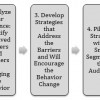Abstract
When Extension agents work to encourage behavioral changes in their community through educational programming, they may already be using some elements of social marketing. Extension educators can use an understanding of their clients’ reservations and inclinations toward a behavior, or their benefits and barriers, to develop strategies that encourage behavior change. Common strategies include prompts and reminders, incentives, and changing social norms. These strategies may be piloted on a small scale, modified if necessary, and then implemented on a large scale and further evaluated. This publication’s purpose is to describe the use of social norms as a social marketing strategy and make recommendations for applying social norms as a tool in Extension programming. This 5-page fact sheet was written by Laura Sanagorski (Warner) and Paul Monaghan, and published by the UF Department of Agricultural Education and Communication, February 2014.
AEC494/WC158: Using Social Norms to Increase Behavior Change in Sustainable Landscaping (ufl.edu)
References
Ajzen, I. (1991). The theory of planned behavior. Organizational Behavior and Human Decision Processes, 50(2), 179-211. https://doi.org/10.1016/0749-5978(91)90020-T
Bator, R. J., & Cialdini, R. B. (2002). New ways to promote proenvironmental behavior: The application of persuasion theory to the development of effective proenvironmental public service announcements. Journal of Social Issues, 56(3), 527-541. https://doi.org/10.1111/0022-4537.00182
Blaine, T. W., Clayton, S., Robbins, P., & Grewal, P. S. (2012). Homeowner attitudes and practices towards residential landscape management in Ohio, USA. Environmental Management, 50(2), 257-271. https://doi.org/10.1007/s00267-012-9874-x
Caravella, J. (2006). A needs assessment method for extension educators. Journal of Extension [Online], 44(1), Article 1TOT2. Retrieved from http://www.joe.org/joe/2006february/tt2.php.
Cialdini, R. B., Reno, R. R., & Kallgren, C. A. (1990). A focus theory of normative conduct: Recycling the concept of norms to reduce littering in public places. Journal of Personality and Social Psychology, 58(6), 1015-1026. https://doi.org/10.1037/0022-3514.58.6.1015
Clayton, S. (2007). Domesticated nature: Motivations for gardening and perceptions of environmental impact. Journal of Environmental Psychology, 27(3), 215-224. https://doi.org/10.1016/j.jenvp.2007.06.001
Gouldthorpe, J. L., & Israel, G. D. (2013). The Savvy Survey #1: Introduction. Gainesville: University of Florida Institute of Food and Agricultural Sciences. http://edis.ifas.ufl.edu/pd061. https://doi.org/10.32473/edis-pd061-2013
McKenzie-Mohr, D. (2011). Fostering Sustainable Behavior (3rd ed.). Canada: New Society Publishers.
Nassauer, J. I., Wang, Z., Dayrell, E. (2009). What will the neighbors think? Cultural norms and ecological design. Landscape and Urban Planning, 92(3-4), 282-292. https://doi.org/10.1016/j.landurbplan.2009.05.010
Perkins, H. W. (2002). Social norms and the prevention of alcohol misuse in collegiate contexts. Journal of Studies on Alcohol, Suppl. 14, 164-172. https://doi.org/10.15288/jsas.2002.s14.164
Rogers, E. M. (2003). Diffusion of innovations (5th ed.). New York: Free Press.
Shaw, B. R., Radler, B. T., Chenoweth, R., Heiberger, P. & Dearlove, P. (2011). Predicting intent to install a rain garden to protect a local lake: An application of the theory of planned behavior. Journal of Extension [On-line], 49(4) Article 4FEA6. http://www.joe.org/joe/2011august/a6.php

